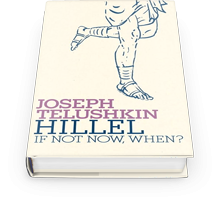Hillel

Joseph Telushkin has long been a favorite author of mine. His monumental work, A Code of Jewish Ethics — a multivolume compendium on the various aspects of Jewish ethics — is both a source of inspiration as well as a quick reference to the various facets of ethics from a Jewish perspective. Although released over three years ago, this work on the great sage Hillel is one which is equally important in its own way.
In Hillel, Telushkin works from a simple premise: Even though Hillel is one of the central voices within Judaism, have we forgotten the values he has given to Judaism, particularly his ethical approach to all things Torah. In this work he attempts to rediscover his distant voice and capture it for Judaism once again. His particular approach is to “distill five aspects of Hillel’s personality: his patience, his moral imagination, his optimism, his nonjudgmental nature, and his intense curiosity.” (p.60)
Telushkin believes these to be the traits by which Hillel was able to make such an impact on Judaism, particularly in the areas of infusing passion, rather than legal minutia, into his students as the starting point for their studies.
He begins by introducing the reader to the stories of Hillel’s rise to leadership within Israel, quickly moving to and focusing in on his most famous story — the one in which a Gentile comes to him and convert him on the condition that Hillel is able explain the whole Torah while the would-be convert stands on one foot. From this story Telushkin reminds his readers what has often been ignored. Hillel condensed the Torah into what may be compared to the Golden Rule of Yeshua: “That which is hateful unto you, do not do unto your neighbor.” Rather than beginning with the belief in one God, or the various “sign commandments” (Sabbath, festivals, keeping kosher, etc.) central to Judaism, Hillel began by giving his student a core value in which the essence of Judaism could be found: the ethical treatment of one’s neighbor.
Reading this information from a Jewish source helps us to better understand the Council at Jerusalem in Acts 15 in which the Apostles ruled of four basic principles which the Gentiles should start observing upon their coming to faith. And as Hillel said, “The rest is commentary.” Hillel was intent upon not making the entrance into Judaism one of difficulty. Likewise, the Council was intent upon not making entrance into the Kingdom one of difficulty either, saying “…we should not make it difficult for the Gentiles who are turning to God.” (Acts 15:19)
But with both Hillel and the Council of Jerusalem, it did not end there. Telushkin reminds us that Hillel’s instruction was, “Go and study.” Likewise, the Council in Acts 15 instructed the Gentile believers, “Instead we should write to them, telling them [these restrictions]… For the law of Moses has been preached in every city from the earliest times and is read in the synagogues on every Sabbath.” (Acts 15:20–21)
Telushkin concludes that Judaism should be defined by its ethical nature, rather than the outward signs of the commandments and the strictures which they detail. A Jew should be known by his speech and deeds, rather than his scrupulous kosher observance. This is also a good reminder for the disciples of Yeshua. Hillel is a good reminder that we should be characterized by our good deeds so that those around us may glorify our Heavenly Father.








